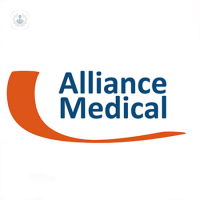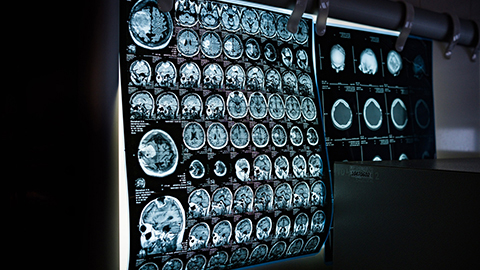MRI scan - 2 areas
An MRI scan, or 'Magnetic Resonance Imaging' is used to detect many neurological and musculoskeletal conditions, especially in the muscles and ligaments, using a strong magnetic field to create high-quality images of the body. The MRI scan is provided by Alliance Medical at Enfield Alliance MRI Centre.
Is MRI safe? Is there anything I need to inform the clinic of before my scan?
MRI scans are very safe, and have no known side-effects. However, precautions should be taken due to the powerful magnetic field generated.
If you have been referred to have an MRI scan, or you are choosing to book one for yourself, before you go ahead you should inform the clinic if you have or are experiencing any of the following:
If you have been referred to have an MRI scan, or you are choosing to book one for yourself, before you go ahead you should inform the clinic if you have or are experiencing any of the following:
- You are or might be pregnant.
- You have a heart pacemaker fitted.
- You have a cochlear implant.
- You have previously had an artificial heart valve fitted.
- You have an electronic drug delivery device fitted.
- You have had any surgical procedures on your head.
- You have any metal implants in your body.
- You have any surgical clips fitted.
- You have had a capsule endoscopy.
- If there is a possibility that you have metal fragments in your eyes, such as from working with metal at high speed, or from an injury.
If there is any possibility, an X-ray may be necessary as the MRI scanner emits powerful magnetic rays which can cause injury by moving metal fragments that are in the body.
What happens before the MRI scan?
Before you arrive for the scan, the clinic will send you a set of safety questions to ensure that it is safe for you to go ahead with with the scan.
Unless the clinic informs you beforehand, it is not usually necessary to make any special preparations such as changes to your diet or medication, or not eating in the hours before.
You may bring a friend or companion with you for the scan, if this helps you to feel more comfortable. Arrive in plenty of time before your scheduled appointment time, and bring your appointment letter with you.
If you need any special requirements, such as you suffer with claustrophobia, you need wheelchair access, or you have hearing or vision difficulties, please inform the clinic before you arrive, so you can be put at ease.
Unless the clinic informs you beforehand, it is not usually necessary to make any special preparations such as changes to your diet or medication, or not eating in the hours before.
You may bring a friend or companion with you for the scan, if this helps you to feel more comfortable. Arrive in plenty of time before your scheduled appointment time, and bring your appointment letter with you.
If you need any special requirements, such as you suffer with claustrophobia, you need wheelchair access, or you have hearing or vision difficulties, please inform the clinic before you arrive, so you can be put at ease.
How should I dress for the MRI scan?
Do not wear jewellery or clothing with metal buttons or zips.
Do not wear a watch for the scan.
Do not wear a watch for the scan.
What happens during the MRI appointment?
Please check in at the reception when you first arrive and a member of the team will explain everything to you about your appointment. You will be provided with space to leave your personal possessions, and to change into a gown if it is required.
You will be met by a radiographer, who will explain the full process to you and answer any quesries that you may have. The radiographer will go through your responses to the questionnaire with you.
You will be guided to lie down on the MRI bed, and helped into the correct position depending on which part of the body is being scanned. If the scan is taking place in an open scanner, you may not be required to lie down, and may be seated in the middle, or helped into position.
The procedure consists of two scans lasting between three to five minutes each, with a short puase between scans. The whole procedure lasts between 15-60 minutes. The radiographer can see you the whole time, and is on hand to help in case you are feeling uncomfortable.
You will be met by a radiographer, who will explain the full process to you and answer any quesries that you may have. The radiographer will go through your responses to the questionnaire with you.
You will be guided to lie down on the MRI bed, and helped into the correct position depending on which part of the body is being scanned. If the scan is taking place in an open scanner, you may not be required to lie down, and may be seated in the middle, or helped into position.
The procedure consists of two scans lasting between three to five minutes each, with a short puase between scans. The whole procedure lasts between 15-60 minutes. The radiographer can see you the whole time, and is on hand to help in case you are feeling uncomfortable.
Is an injection required?
A gadolinium contrast medium may be necessary to be injected into a vein before the scan, depending on the information that is needed. This helps the radiography team to see more from the scan if this is required.
The contrast medium usually either has no side-effects or mild side-effects, however there is a small chance of allergic reaction including nausea, itching, dizziness, and headaches.
The contrast medium usually either has no side-effects or mild side-effects, however there is a small chance of allergic reaction including nausea, itching, dizziness, and headaches.
What happens after the MRI scan?
Following the scan, you can return to your normal activities without restrictions including eating and drinking normally, and you will be able to drive home after the scan.
If a contrast medium was required, you will be monitored for 15 minutes following the procedure to check that you are not experiencing any side-effects.
The radiographer will examine the scans following the procedure, and send the results to your doctor or consultant in the days following the scan. Only your doctor or consultant can discuss the results with you, not the staff at the clinic.
If a contrast medium was required, you will be monitored for 15 minutes following the procedure to check that you are not experiencing any side-effects.
The radiographer will examine the scans following the procedure, and send the results to your doctor or consultant in the days following the scan. Only your doctor or consultant can discuss the results with you, not the staff at the clinic.
What type of scanner is used?
The scanner used at the Enfield Alliance MRI Centre is an ASG Paramed MRI open scanner. This is the most open type of MRI scanner that can be used for most areas of the body, and accomodates most patients such as those with claustrophobia, high BMI, and vertigo.
Procedures
Non-refundable product
You have 90 days to use the service
Legal terms and Privacy policies


